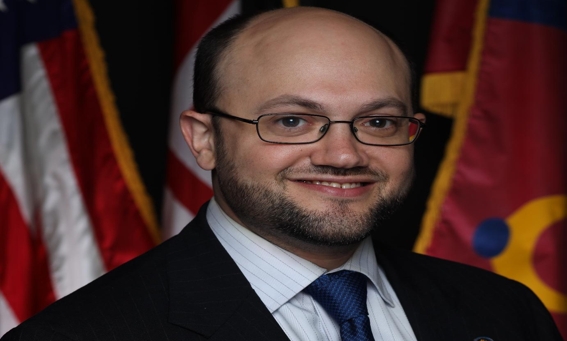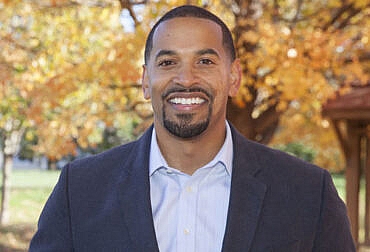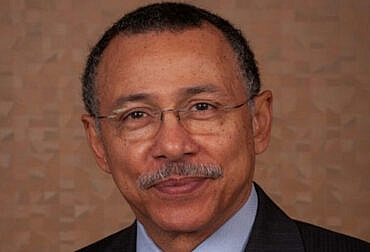Nagender Madavaram discussed with Assistant Chief Administrative Officer, Jake Weissmann about various issues in the county. Weissmann brings legislative and State operations experience to Montgomery County. Most recently, he served as Chief of Staff, Office of the Senate President for the Maryland State Senate. He is an experienced manager of both staff and budgets and knows how to work collaboratively with diverse and varied coalitions. The interview covers topics of transportation, economy, jobs, Montgomery County Revenue Authority, environment, supporting of businesses, and Department of Housing Affairs.
Transportation:
Nagender Madavaram: Transportation is major problem in the county. Particularly, 355 and I-270 are not expanded to meet the demand of new developments in the county.
Jake Weissmann: It’s a fascinating question. It’s not even unique problem to our region. Obviously, increased transportation hurdles are a good sign of economic growth. You’ve seen along I-270, the increased economic growth with the life sciences companies and other companies. It’s just a sign of good things from the county perspective. Is the binary question of do we grow more? Do we add more lanes or do we add more buses and instead look at it as a systems question? The biggest question is whether we get cars off the road? So, obviously increased funding to public transportation system is part of that equation. The state has made great leaves in the last couple of years by increasing funding. Part of it is what we do with our rapid transit system in the county. So, Ride On, which operates about 400 buses and transports about 45,000 riders every week. So, that’s 45,000 people who aren’t in vehicles. There’s a couple of things that is really good. Ride On Reimagined Study, which is a comprehensive forward-looking assessment of the bus network to realign and reassess.
The Ride On network’s outreach efforts are starting next month. I would encourage all residents whether you currently use Ride On or not look out for ways to offer feedback and get involved. There will be a variety of community surveys because this study will have a huge impact on what our transit system looks like. There’s also our key FLASH Bus Rapid Transit (BRT) and I love the Flash BRT service. It’s on Route 29, but there’s other locations that’s in the capital improvement program, Veirs Mill Road (MD 586), MD 355, New Hampshire Avenue and North Bethesda corridors. We will do it in different segments in various phases because of cost. Thankfully, our state partners have been very helpful. There’s 61 million in the state capital budget this year to help with bus rapid transit, as well as the county working with our state partners was able to get 27 million in perpetuity for bus rapid transit. We are getting money from the state because Montgomery County is the leader in the BRT system. It’s exciting from a transportation standpoint because we are moving in the right direction.
Economy:
Nagender Madavaram: Are you satisfied with the service of Montgomery County Economic Development Corporation? The county is spending $6 million a year for this corporation. Did the corporation play any role in bringing the 18 billion investments to Bio Tech sector?
Jake Weissmann: First, let me say, I spend more time on economic development than anything else. I think people are sleeping on a story here. The exciting economic development news in the country, right in the last three weeks, there’s been announcements of a little over 3,000,000 feet of wetlands space being developed. We did increase the budget for MCEDC. The corporation’s budget has been planned for the last five years. It’s also because they’ve spent down their reserves. It’s important the County Council and County Executive in 2016 decided to move economic development out of the county government and established a quasi-governmental entity. It is important that we provide the funding to have sustained economic development.
I think there are ongoing questions about how MCEDC can perform better? In private business and government service, things need to be evaluated and improved. You know, we have this opportunity where we just went through an economic development strategic plan that was ratified by the Council. The County Executive had about 10 pages of comments, the Council adopted some of them. Actually, pleased that the Council followed the Executive’s recommendations on incorporating more metrics into the strategic plan. So, for the first time we have strategic plan that has metrics to follow in that regard. We have this opportunity to reevaluate and refine the roles, make sure that county government, our partners and MCEDC are working on their mission. I think we’re going to hear more conversations about that moving forward. There’s a lot of exciting things happening in this county.
Jobs:
Nagender Madavaram: Are we getting new companies? How is job market in the county?
Jake Weissmann: I mean workforce is a fascinating part of this conversation. Montgomery County has the second most PhDs in the country in life sciences. A lot of people don’t realize that NIH, NIST and FDA are part of the Montgomery County. When incredible thing comes out of NIH, NIH doesn’t brand it as Montgomery County pride, but it is something that happened with scientists who live, work and play in Montgomery County. These are Montgomery County residents who are coming up with lifesaving discoveries every day. These are well paying jobs in our life sciences companies. Horizon Therapeutics just announced a month ago that they’re opening up their East Coast manufacturing hub in the county. It’s 192,000 square feet facility. This is an Ireland based company that acquired Yellow Pharmaceuticals a year and a half ago and it is now expanding its footprint. We need to make sure that we are providing the workforce as necessary and we have great partners over at workforce development. We have a Memorandum of Understanding with the University System of Maryland to work with our partners in Montgomery College and University of Shady Grove to grow the workforce. We have programs in place to expand our workforce.
Montgomery County Revenue Authority:
Nagender Madavaram: Montgomery County Revenue Authority uses its bonding authority to partner with the private sector and government agencies to fund projects throughout Montgomery County. How the authority helps the county in economic growth?
Jake Weissmann: This is fascinating little quasi-governmental entity. There are nine public golf courses in the county. It’s tough to find another county that has nine public golf courses. These are open to the public. They’re fantastic. People come from all around the county. The courses are affordable for all ages. It actually seemed increased interest during COVID because the outdoor recreation that anybody can take up. MCRA operates nine public golf courses, county airport right in upper county and then they do with hospitality financing. One of the exciting things that we’re going to have the ribbon cutting in next month is Crosswinds Winery that was one of the County Executive’s innovations that MCRA operates it. This is Montgomery County’s phenomenal work when it comes to the vineyards and the breweries in the county. The agriculture reserve, which has got this phenomenal potential and is really just exploding with these opportunities.
Environment:
Nagender Madavaram: Environmental initiatives of the county are hot topic. What the county is planning to do?
Jake Weissmann: There is no greater statement of our priorities than our budget, and you look at the connectives proposed in budget and the County Council is reviewing it. It’s exciting. We’ve got this, land breaking best policy. Hopefully the County Council is going to vote out soon. That plan will reduce energy consumption and greenhouse gas emissions in the public. It’s close to 19 million in new funds for the Montgomery County Green Bank. We got funds to improve the health of our urban forest. We rolled out yesterday a new litter control system. we’ve also gone back to more accessible rights to bus riders. The budget accounts $1.00 for Ride On fares and also moving county buses to 0 emissions. Montgomery County alone is not going to fix climate problem. It’s a worldwide problem, but Montgomery County has shown eight commitments to do everything we can to address climate change without putting the county at a competitive disadvantage. The county is really a strong and aggressive leader. You know, we’ve got a climate action plan that’s been ratified by the Council. There’s just a lot is going on when it comes to making sure that the county is going to meet its goals of cutting greenhouse gases 80% by 2027 and 100% by 2035. That’s is bold action. We’ve got a hell of a team in a Department of Environmental Protection that wakes up every day, looking to see how they can do a better job at combating climate change, reducing litter and protecting our empire.
Supporting Businesses:
Nagender Madavaram: Do you deal with helping of businesses?
Jake Weissmann: In my portfolio we have the business advancement team, Judy Costello leads it. She is just a treasure to this country, that we are incredibly lucky. The business advancement team is responsible for the Economic Development Fund and a variety of other funds to help sustain and grow businesses. This is anything from providing incentives to make sure that Marriott stays in the county and providing assistance to our small businesses to keep them growing. So, if you suddenly find yourself experiencing homelessness, DHHS, Health and Human Services has some great assets. I mentioned Environmental Protection, some grants that they offer. We have the new office of Grants Management that is in the budget this year and hopefully the county will approve to make it easier for grants to be operating in the county. The new office helps county departments more aggressively seek out federal and state grants, as well as private grants to be able to provide more systems to people.
Department of Housing Affairs:
Nagender Madavaram: what role Department of Housing Affairs plays in providing affordable housing in the county?
Jake Weissmann: We are also dealing with the housing community. Housing inspectors respond to housing complaints as well as to periodic checks. Obviously, they have to do a lot of moving because people don’t want to let inspectors into their apartments to do inspections. So, big picture in the county is we have more than 20,000 households earning up to about 31,000 a year. They are paying more than half of their income for rent. So, for perspective, minimum wage in the county is $15.00 an hour. It will go up to $15.70 for big businesses later this year. So, $15.00 an hour is about $31,000 a year. If you’re a single parent household with making $31,000 a year more than half of your income is going to rent. Imagine that after taxes you have to live with the other half income. We have 6,500 housing units along the Purple Line where we’re expecting the rents to increase due to proximity to transit. You start to see the breadth of the problem when it comes to affordable housing in this country. So, DHA is being very aggressive and applying every available policy, tool and financial resource to reduce housing cost. We do that by increasing the number of affordable housing units, provide rent supports, and do whatever we can to preserve current affordable housing.
There’s $140 million in the budget this year for affordable housing in the county and $100 million for loans to produce and preserve housing. It’s designated to provide to preserving those housing with their current rents at or below 70% of AMI, which communicates to the community that at least that much will be available for preservation. Another $54 million for long term funding to support preservation of affordable housing.
We have great partner in the Housing Opportunities Commission that works in affordable housing as well. It’s really all hands-on deck and HCA is focused on where we can preserve affordable housing, where we can sustain and provide grants to help to make sure that people can afford to live in this county. This county shouldn’t just be a place where you need a higher degree to live and that’s where the HCA is focused on making sure that there is as much affordable housing in this setting.
Nagender Madavaram: You spent more than a decade in Annapolis and moved to Rockville. How do you feel in your current position?
Jake Weissmann: I came here almost six months ago, after 14 years in the state. When I decided to leave the Senate President’s office, I was looking at a variety of opportunities. Richard Madaleno, CAO offered me this opportunity. Rich was in the Senate and I know him. He is one of the smartest people I know. You know it was an interesting opportunity. I was talking to Councilmembers, Delegates and Senators, activists and variety of people consistently. The sense I got was this is an exciting offer then I got to come here. The work is absolutely fascinating and the people here are fantastic. I work with a lot of people who work in government. It is incredible to see the people who work in this government are so consistently passionate and focus on improving people’s lives and making this country a better place.
I get to work with the variety of people in the private sector who come with different viewpoints. Sometimes it puzzles me why people are hesitant to acknowledge about what’s going on here. Thankfully, that doesn’t apply to the CAO or the County Executive. So much is going on here. Thankfully, we have a populist that sees the value in lifting all boats. You know, rising all tides and making sure to help out others which is an incredibly inspiring thing. I have seen so much is going on. You know there are the passionate and dedicated public servants who want to improve and sustain the growth. Nowhere else I have seen this level of enthusiasm. I’m grateful for the opportunity to see where we can grow and where can we make things happen.











